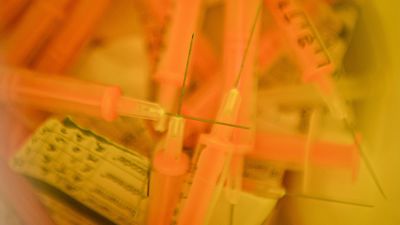Covid: PM has 'grave concerns' after EU imposes controls on vaccines moving to Northern Ireland

Video report by ITV News Science Editor Tom Clarke
Boris Johnson has told EU Commission president Ursula Von Der Leyen he has "grave concerns" after the bloc triggered part of the Brexit agreement to stop exports of Covid-19 vaccines to Northern Ireland as part of its wider clampdown on jabs leaving its borders.
ITV News' Carl Dinnen says it is anticipated that the EU will row back on their stance.
The prime minister earlier "stressed the UK’s enduring commitment to the Belfast/Good Friday agreement" to Irish premier Micheal Martin during a conversation on Friday.
A No 10 spokesperson said the prime minister also told Mr Martin: "The EU must urgently clarify its intentions and what steps it plans to take to ensure its own commitments with regards to Northern Ireland are fully honoured."
Stormont First Minister Arlene Foster branded the EU’s triggering of Article 16 of Brexit’s Northern Ireland Protocol to stop unfettered flow of inoculations from the EU into the region an “incredible act of hostility”.
Cabinet Minister Michael Gove has spoken to European Commission Vice President Maroš Šefčovič to express concern over a lack of notification from the EU over the decision to invoke the protocol.
He said the UK would now be "carefully considering next steps".
Earlier the EU said it will restrict exports of Covid-19 vaccines produced within its borders, potentially putting the supply of some of the UK's jabs at risk.
What's happened?
Under the terms of the new Brexit protocol, goods should be able to move freely between the EU and Northern Ireland as the region remains in the single market for goods and still operates under EU customs rules.
ITV Science Editor Tom Clarke discusses the latest vaccines
But the EU has used the powers in the protocol to temporarily place export controls on this movement in respect of vaccines.
A spokesperson for Number 10 said: "The UK Government is urgently seeking an explanation from the European Commission about the statements issued by the EU today and assurances as to its intentions.
"The UK has legally-binding agreements with vaccine suppliers and it would not expect the EU, as a friend and ally, to do anything to disrupt these contracts."
Stormont First Minister Mrs Foster said: “By triggering Article 16 in this manner, the European Union has once again shown it is prepared to use Northern Ireland when it suits their interests but in the most despicable manner – over the provision of a vaccine which is designed to save lives.
“At the first opportunity, the EU has placed a hard border between Northern Ireland and the Republic of Ireland over the supply chain of the coronavirus vaccine.”
Sinn Fein vice president Michelle O’Neill has spoken with the Irish government over the European Commission decision to trigger Article 16 of the Northern Ireland protocol.
She tweeted: “I have just spoken with the Irish Govt to raise my very serious concerns in relation to the invoking of Art. 16.
“This is a totally ill judged move by the EU and should not have been triggered. Calm heads need to prevail, this needs sorted urgently.”
Irish Foreign Minister Simon Coveney said: “We are working with the EU Commission to try to resolve this issue and protect the integrity and operation of the NI Protocol.”
The regulation means Northern Ireland will be considered an export territory for the purposes of vaccine sent from the EU/the Republic of Ireland.
What is the Northern Ireland protocol?
The Northern Ireland protocol is the agreement between the EU and the UK over the future of Northern Ireland post Brexit.
The agreement meant Northern Ireland has effectively stayed in the Customs Union while the other three countries of the UK have left, creating a border down the Irish Sea.
The new arrangement has created problems for many businesses as they try and figure out the new rules where economically Northern Ireland feels tied to the EU but politically, legally and socially it is part of the UK.
Within the agreement are various agreements over what to do in case of a dispute or issues arises around imports and exports.
Article 16 is one of these provisions which allows one party to limit exports and imports if "serious economic, societal or environmental difficulties that are liable to persist, or to diversion of trade."
Why have the EU done this?
The decision came amid a deepening row between the EU and AstraZeneca over supply shortages in the bloc.
AstraZeneca has previously said the yields at some of its EU based plants had been lower than expected and would not be able to supply as much of the vaccine to the bloc as promised.
The EU authorised the rollout of the AstraZeneca vaccine on Friday.
On Thursday, Germany ruled that it should only be recommended for under 65s.
The EU wants doses of the AstraZeneca vaccine to be sent from British plants to solve its vaccine supply shortage issues.
European Commission executive vice-president Valdis Dombrovskis told a Brussels press conference: “Today the commission has adopted an implementing regulation making the export of certain products subject to an export authorisation.
“This regulation concerns the transparency and export of Covid-19 vaccines.”
The “vaccine export transparency mechanism” will be used until the end of March to control vaccine shipments to non-EU countries and to ensure that any exporting company based in the EU first submits its plans to national authorities.
The UK was not named among countries exempted from the new measures.
Preventing vaccines made within the bloc from being exported could damage the UK’s access to further supplies, particularly to the Belgian-made Pfizer jab.
Officials said it is intended to ensure member nations get the shots they bought from vaccine producers.